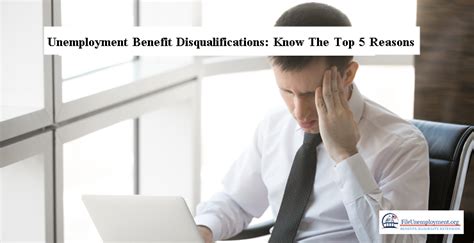Potential Disqualifiers For Unemployment Benefits: What To Know

Unemployment benefits are a crucial safety net for workers who lose their jobs through no fault of their own. However, not everyone who applies for unemployment benefits is eligible to receive them. There are several potential disqualifiers that can prevent you from receiving benefits, and it’s important to understand what they are before you apply.
1. Voluntary Quit
If you quit your job voluntarily, you may not be eligible for unemployment benefits. This includes quitting because you didn’t like the job, you didn’t get along with your co-workers or boss, or you wanted to go back to school. However, if you quit for a good cause, such as harassment or discrimination, you may still be eligible for benefits.
2. Fired for Misconduct
If you were fired for misconduct, you may not be eligible for unemployment benefits. Misconduct includes things like stealing, fighting, being drunk on the job, or violating company policies. However, if you were fired for reasons beyond your control, such as a layoff or downsizing, you may still be eligible for benefits.
3. Refusing Suitable Work
If you refuse an offer of suitable work, you may not be eligible for unemployment benefits. Suitable work is work that is similar to your previous job in terms of pay, hours, and skill level. However, if the job is not suitable, such as being too far away or requiring skills you don’t have, you may still be eligible for benefits.
4. Not Available for Work
If you are not available for work, you may not be eligible for unemployment benefits. This includes things like taking a vacation, being in jail, or being unable to work due to a disability. However, if you are only temporarily unavailable, such as being out of town for a job interview, you may still be eligible for benefits.
5. Not Actively Seeking Work
If you are not actively seeking work, you may not be eligible for unemployment benefits. This means you must be making a good faith effort to find a new job, such as applying for jobs, attending job fairs, and networking. However, if you are unable to work due to a disability or other valid reason, you may still be eligible for benefits.
6. Receiving Severance Pay
If you are receiving severance pay, you may not be eligible for unemployment benefits. Severance pay is a lump sum payment that an employer gives to an employee upon termination. However, if the severance pay is spread out over a period of time, you may still be eligible for benefits.
7. Self-Employment
If you are self-employed, you are generally not eligible for unemployment benefits. However, if you have been paying into your state’s unemployment insurance program and have lost your self-employment income through no fault of your own, you may be eligible for benefits.
8. Not Meeting Minimum Wage or Work Requirements
Each state has its own minimum wage and work requirements that you must meet to be eligible for unemployment benefits. If you do not meet these requirements, you may not be eligible for benefits.
9. Not a U.S. Citizen or Legal Resident
If you are not a U.S. citizen or legal resident, you may not be eligible for unemployment benefits. However, if you are authorized to work in the U.S. and have lost your job through no fault of your own, you may be eligible for benefits.
10. Fraud or Misrepresentation
If you commit fraud or misrepresent yourself in any way during the unemployment benefits application process, you may not only be ineligible for benefits, but you may also face legal consequences.
Conclusion
Understanding the potential disqualifiers for unemployment benefits is crucial before you apply. If you are unsure whether you are eligible for benefits, contact your state’s unemployment office for more information.
FAQs
What is a good cause for quitting a job?
A good cause for quitting a job is a reason that is beyond your control, such as harassment, discrimination, or unsafe working conditions.
What is suitable work?
Suitable work is work that is similar to your previous job in terms of pay, hours, and skill level. If the job is not suitable, such as being too far away or requiring skills you don’t have, you may still be eligible for benefits.
What is a good faith effort to find a new job?
A good faith effort to find a new job means you are actively seeking work, such as applying for jobs, attending job fairs, and networking.
Can I receive unemployment benefits if I am self-employed?
Generally, no. However, if you have been paying into your state’s unemployment insurance program and have lost your self-employment income through no fault of your own, you may be eligible for benefits.
What happens if I commit fraud or misrepresentation during the unemployment benefits application process?
If you commit fraud or misrepresent yourself in any way during the unemployment benefits application process, you may not only be ineligible for benefits, but you may also face legal consequences.
